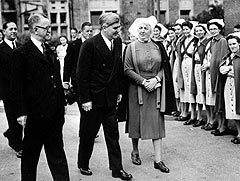A Labour delivery
Aneurin Bevan (1897-1960) was the charismatic Labour politician who created the National Health Service.
He is sometimes confused with Ernest Bevin, the trade union leader and Minister of Labour responsible for the wartime recruitment of miners – the “Bevin Boys” whose numbers included the future disc jockey Jimmy Saville.
The famous phrase “from the cradle to the grave” applied to NHS and welfare state is often attributed to him. But it wasn’t his. Winston Churchill first coined it in a radio broadcast.
Bevan was the youngest Cabinet minister in the 1945 Labour government. He was Minister of Health – a brief which also included housing.
From Tredegar to Tannochbrae
His politics were shaped by the mining community of Tredegar in South Wales. Bevan returned there in 1921 – around the same time that AJ Cronin arrived to take up his post with the Tredegar Workmen’s Medical Aid Society.
Elected to the district council in April 1922, Bevan had already set up the Query Club, a semi-secret group of radicals who set out to challenge the power of the Tredegar Iron and Coal Company which dominated all aspects of the town’s life, including the Medical Aid Society.
Similar local schemes operated in other parts of Britain. Tredegar was one of the most advanced, offering free care to workers and their families based on graduated payments.
Doctors like Cronin were paid salaries every quarter. The Society did not offer universal care – and there were internal disputes on whether unemployed people (which at that time included Bevan himself) should qualify for treatment.
Given their public profiles, it seems unlikely that the two were unaware of each other. For those who seek common ground: both had an interest in miners’ diseases such as nystagmus the spasmodic eye movement which afflicted Bevan and pneumoconiosis which killed his father.
There is a Sam Bevan character in The Citadel (rescued from a pit after having his arm amputated by the hero doctor Andrew Manson). Cronin’s publisher Victor Gollancz also set up the Tribune newspaper which Bevan edited.
But there is no evidence that they ever met in the two years they shared in Tredegar.
The Medical Aid Society’s records show that Bevan was elected to its management committee but not until April 1926 – by which time Cronin had long departed.
Bevan and Scotland
Bevan had close links with Scotland. His father’s hero was John Wheatley. He married Fife-born Jennie Lee and his circle of friends included fellow MP George “Geordie” Buchanan, and the surgeon Jock Milne at Bangour Hospital in West Lothian.
Bevan’s vision for the NHS was for the whole of Britain. It was a monumental administrative and political challenge.
In three years he succeeded in delivering a universal service for all the people – “in place of fear”, as he described it.
The BMA, aghast at the prospect of doctors becoming state or, worse still, local authority employees, waged a vitriolic campaign against it.
There were also misgivings in Scotland, but in the final BMA ballot of May 1948 GPs and hospital doctors in Scotland voted in favour whilst their counterparts in England remained against the new service.
- Further information
- Tredegar Medical Aid Society
- Bevan primary sources

"All I am doing is extending to the entire population of Britain the benefits we had in Tredegar for a generation or more. We are going to 'Tredegarise' you"
Aneurin Bevan (quoted by Dr John Davies, BBC Wales broadcast February 2006)
“There was plenty of interesting work for me. Under the medical aid scheme which had engaged me, all the miners paid a small weekly contribution to the society and were entitled thereby to free medical treatment for their families and themselves.
“In actual fact, this scheme can definitely be regarded as the foundation of the plan of socialized medicine which was eventually adopted by Great Britain. Aneurin Bevan, who was mainly responsible for the national project, was at one time a miner in Tredegar, and here, under the local aid organisation, the value of prompt and gratuitous treatment, was strongly impressed upon him.”
AJ Cronin, Adventures in Two Worlds, 1952
